完整初中英语介词用法.docx
(完整版)初中英语介词用法大全,推荐文档

6 表示能力擅长于…固定考点:be good at;be bad at;an expertatHe is good at drawing(at 后接名词或动名词)初中阶段应掌握In 的常见短语介词短语at first 首先,开始时;at last;at most;at least 至少;at all events 无论如何;at home 在家,无拘束;at a loss 不知怎办;at any rate 不管怎样;at length 详细地;be at high tide 处于高潮期;at ourinvitation 应我们的邀请;at our request 应我们的请求;at the news 听到这消息;at the risk of冒……危险;at a great expense 以巨大费用;at intervals of 每隔;at the sight of 一见到 at thepoint of 接近,靠近;at the thought of 一想到;at the speed of 以……速度;at the cost (price) of以……为代价;at leisure 闲着、失业;at stake 在危险中、在成败关头;at bottom 实际上、本质上;atshort notice 一得到通知;at seeing us 看到我们;at the present stage 在现阶段;at the weekend 周末;at all times 永远;动词短语call at 访问(某地);come at 袭击,攻击; get at 意指,本意是;理解;到达; knock at 敲打(门窗),敲击; look at 看; work at 从事, 致力于, 钻研; laugh at 嘲笑;glare at 怒目而视; glance at 匆匆一瞥;point at 指向6.across 动词短语go about 着手,四处走走;set about 着手,开始;worry about 为…担心; come about 发生;care about 关心、在意;bring about 引起,带来,导致;knock about 漫游;look about 四处看看,四处环顾;set about doing 着手做,开始;turn about 向后转;think about 考虑(是否去做);argue about 争论; know about 了解;hear about 听说;askabout 询问;chat about 闲聊;quarrel about 争吵;speak/talk about 谈论;complain about 报怨备注-among 与between 的区别:三者与两者之间的区别。
(完整word版)介词用法归纳,推荐文档
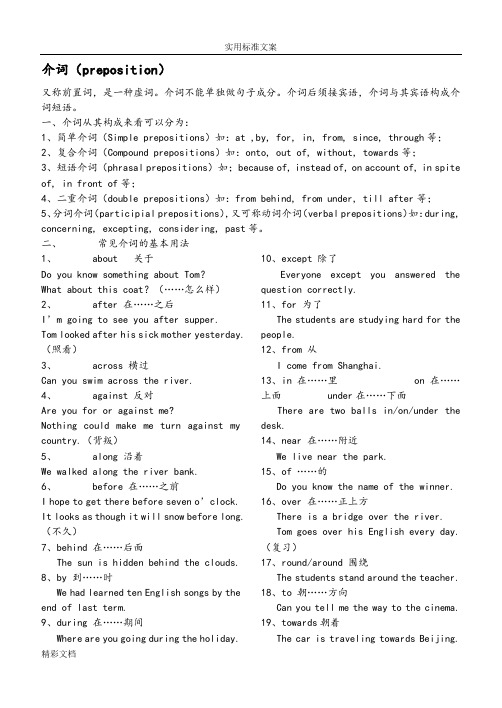
介词(preposition)又称前置词,是一种虚词。
介词不能单独做句子成分。
介词后须接宾语,介词与其宾语构成介词短语。
一、介词从其构成来看可以分为:1、简单介词(Simple prepositions)如:at ,by, for, in, from, since, through等;2、复合介词(Compound prepositions)如:onto, out of, without, towards等;3、短语介词(phrasal prepositions)如;because of, instead of, on account of, in spite of, in front of等;4、二重介词(double prepositions)如:from behind, from under, till after等;5、分词介词(participial prepositions),又可称动词介词(verbal prepositions)如:during, concerning, excepting, considering, past等。
二、常见介词的基本用法1、 about 关于Do you know something about Tom?What about this coat?(……怎么样)2、 after 在……之后I’m going to see you after supper. Tom looked after his sick mother yesterday.(照看)3、 across 横过Can you swim across the river.4、 against 反对Are you for or against me?Nothing could make me turn against my country.(背叛)5、 along 沿着We walked along the river bank.6、 before 在……之前I hope to get there before seven o’clock. It looks as though it will snow before long.(不久)7、behind 在……后面The sun is hidden behind the clouds.8、by 到……时We had learned ten English songs by the end of last term.9、during 在……期间Where are you going during the holiday. 10、except 除了Everyone except you answered the question correctly.11、for 为了The students are studying hard for the people.12、from 从I come from Shanghai.13、in 在……里 on 在……上面 under在……下面There are two balls in/on/under the desk.14、near 在……附近We live near the park.15、of ……的Do you know the name of the winner.16、over 在……正上方There is a bridge over the river.Tom goes over his English every day.(复习)17、round/around 围绕The students stand around the teacher.18、to 朝……方向Can you tell me the way to the cinema.19、towards朝着The car is traveling towards Beijing.20、with 和……一起me?Would you like to go to the cinema with学习这些介词时可以先记住它的汉语意思,然后参照例句来加深理解,并在今后的学习中加以灵活运用。
(完整)七年级介词用法

一、表示时间和日期的介词at表示某一时刻或时间上的某一点on表示某一天,某一天的上午、下午或晚上in表示年、季节、月份、周,或泛指上午、下午或晚上;二、表示方位的介词on意为“在……的上面”;over意为“在……(垂直)的正上方”;above意为“在……(不一定垂直)的上方”;under意为“在……(垂直的)正下方”;below意为“在……(不一定垂直)的下方”;near意为“在……附近”;next to意为“紧挨着……”;round / around 意为“在……周围”;by意为“在……旁边”;表示两者的位置关系时in表示“在同一区域内或同一范围内”;on表示“接壤;相邻”;to表示“相离;相隔”,两者不属同一范围,也不接壤。
三、表示延续时间的介词by意为“在……之前;不迟于……”;for意为“历时……之久;持续……”;in意为“在……以后;在……时间内”;since意为“自从……以来;自……以后”;until 用于否定句中,意为“直到……才”,其前的谓语动词多为非延续性动词,用在肯定句中,意为“直到……为止”,其前谓语动词须用延续性动词。
如:他已经当老师9年了。
He has been a teacher ________ nine years. 我已经在这儿住了10年了。
I have lived here ________ ten years ago.他十分钟之后将会回来。
He will be back ________ ten minutes.知道五月,我们才会看到一些花。
We don’t see any flowers ________ May.你必须得在这里站到太阳落下去为止。
You must stand here ________ the sun sets. 我明天早晨八点前必须得到校。
I must be at school ________ eight tomorrowmorning.你能在五分钟之内干完这些工作吗?Can you finish your work _______ five minutes?四、表示方式的介词介词用来表交通,常把by, in, on来用;限定、复数用in / on,by要直通海陆空;(骑马、骑车惯用on,小轿车前in才通)【注】1. by + 交通工具,意为“乘坐……”。
初一知识点解析介词用法详解

初一知识点解析介词用法详解一、介词的定义及功能介词是英语中一种重要的词类,用来表示名词与名词、名词与动词、名词与形容词之间的关系。
它常常位于名词前面,用来修饰名词或者说明事物的位置、方向、时间等。
二、介词的分类1. 表示位置关系的介词:on、in、under、above、below、inside、outside等。
例句:- The book is on the desk.(书在桌子上。
)- The cat is under the table.(猫在桌子下面。
)2. 表示时间关系的介词:at、in、on、before、after、during等。
例句:- I will meet you at 7 o'clock.(我会在7点钟见你。
)- We will go to the cinema on Sunday.(我们将在星期天去电影院。
)3. 表示方向关系的介词:to、from、over、across、through等。
例句:- He ran to the park.(他跑向公园。
)- We walked across the bridge.(我们走过桥。
)4. 表示方式、原因的介词:with、without、by、for等。
例句:- She writes with a pen.(她用钢笔写。
)- They came by train.(他们坐火车来。
)三、常用介词短语1. in front of:在...前面例句:- The cat is sitting in front of the door.(猫正坐在门前。
)2. at the back of:在...后面例句:- There is a garden at the back of the house.(屋后有一个花园。
)3. in the middle of:在...中间例句:- The tree is in the middle of the park.(这棵树在公园中间。
初一英语常见介词用法归纳

初一英语常见介词用法归纳1. 引言1.1 初一英语介词的定义Introduction:Prepositions are essential parts of speech in the English language. They are words that show the relationship between a noun or pronoun and other words in a sentence. Prepositions are used to indicate location, time, direction, or possession.1.2 介词在句子中的作用In a sentence, prepositions function to show the relationship between the noun or pronoun that follows them and other words in the sentence. They indicate location, direction, time, manner, or possession. Prepositions are essential for conveying clear and precise meaning in English sentences.2. 正文2.1 常见的初一英语介词在初一英语学习中,介词是一个非常重要的语法成分。
介词通常位于名词、代词或动词前面,用来表示名词、代词或动词与其他词之间的关系。
在初一阶段的英语学习中,孩子们需要掌握一些常见的英语介词,以便正确地构建句子和表达自己的意思。
1. In(在…里面)- I have a book in my bag.(我书包里有一本书。
)- There is a cat in the box.(盒子里有一只猫。
)这些是初一阶段常见的英语介词,掌握它们的用法可以帮助孩子们更准确地表达自己的意思,构建正确的句子。
英语介词用法总结(完整).docx
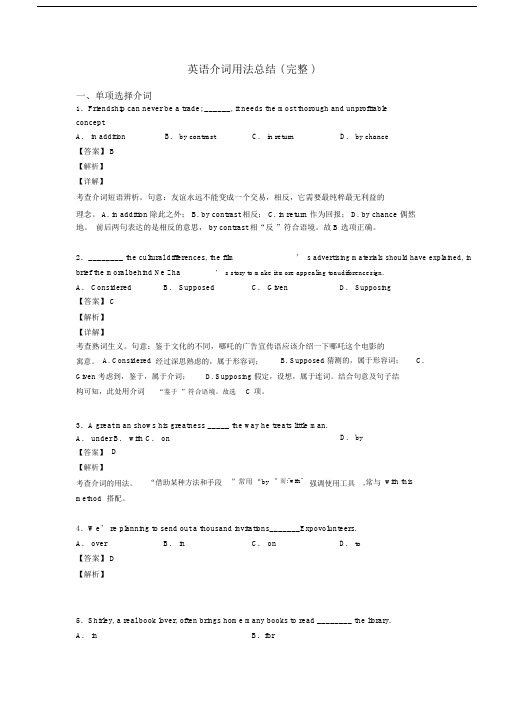
英语介词用法总结 ( 完整 )一、单项选择介词1.Friendship can never be a trade; ______, it needs the most thorough and unprofitableconcept.B. by contrast C. in return D. by chanceA. in addition【答案】 B【解析】【详解】考查介词短语辨析。
句意:友谊永远不能变成一个交易,相反,它需要最纯粹最无利益的理念。
A. in addition 除此之外; B. by contrast 相反; C. in return 作为回报; D. by chance 偶然地。
前后两句表达的是相反的意思, by contrast 相“反”符合语境。
故 B 选项正确。
2.________ the cultural differences, the film’ s advertising materials should have explained, in brief the moral behind Ne Zha’ s story to make it more appealing toaudifor e ncesign.A. Considered B. Supposed C. Given D. Supposing【答案】 C【解析】【详解】考查熟词生义。
句意:鉴于文化的不同,哪吒的广告宣传语应该介绍一下哪吒这个电影的寓意。
A. Considered经过深思熟虑的,属于形容词; B. Supposed 猜测的,属于形容词; C.Given 考虑到,鉴于,属于介词; D. Supposing 假定,设想,属于连词。
结合句意及句子结构可知,此处用介词“鉴于”符合语境。
故选 C 项。
3.A great man shows his greatness _____ the way he treats little man.A. under B. with C. on D. by【答案】D【解析】考查介词的用法。
(word完整版)初中英语介词用法全

初中阶段介词用法汇编※一、表示时间的介词:1、at、on、in“at时间点,有on必有天,in指月季年,也和色相连”就是说,有具体的时间点的时候用at,具体那一天用on,说到月份,季节,年份,就用in ;而且说谁穿了什么颜色的衣服的时候,也是用in XX(color)】at用于某一具体时刻或重大节日之前①在五点钟______②在中午________③在夜晚________④在圣诞节________⑤在午夜_________【答案】①at five o’clock ②at noon ③at night ④at Christmas ⑤at midnight(2)on用在具体某一天或某天的上午、下午、晚上之前①在国庆节_________②在周二晚上_________③在星期天_________【答案】①on National Day ②on Tuesday evening ③on Sunday(3)in用在周、日、季节或泛指的上午、下午、晚上前①在一周内_________②在五月_________③在夏季_________④在2009年_________⑤在下午_________ 【答案】①in a week ②in may ③in summer ④in 2009 ⑤in the afternoon归纳总结在初中阶段常见的固定短语in English用英语 in a minute一会儿、立刻 in a short while一会儿、不久in a hurry匆匆忙忙 in danger在危险中 in full全部地、详细地in a word一句话 in all总共 in every case不管怎样in the end最后 in spite of尽管 in person亲自in fact事实上 in good health身体健康的 in front of在……前面in some ways在某些方面 in common共同的 in public当众☆考题再现:---Who was the first man with A(h1n1) flu in mainland China know for sure?---________May 11,2009.A InB OnC ForD Since【答案】B 【解析】在具体的某一天用on2、before、afterbefore表示“在某时刻或某件事之前”,after用在时刻或某件事之后。
(完整版)英语中介词的用法
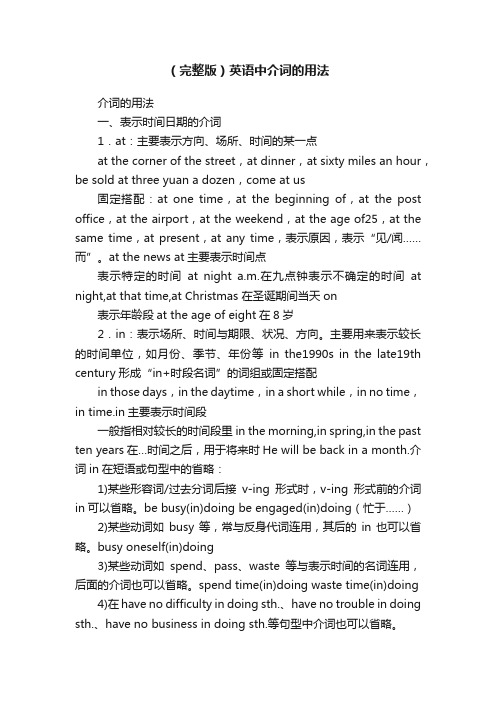
(完整版)英语中介词的用法介词的用法一、表示时间日期的介词1.at:主要表示方向、场所、时间的某一点at the corner of the street,at dinner,at sixty miles an hour,be sold at three yuan a dozen,come at us固定搭配:at one time,at the beginning of,at the post office,at the airport,at the weekend,at the age of25,at the same time,at present,at any time,表示原因,表示“见/闻……而”。
at the news at主要表示时间点表示特定的时间at night a.m.在九点钟表示不确定的时间at night,at that time,at Christmas 在圣诞期间当天on表示年龄段at the age of eight在8岁2.in:表示场所、时间与期限、状况、方向。
主要用来表示较长的时间单位,如月份、季节、年份等in the1990s in the late19th century形成“in+时段名词”的词组或固定搭配in those days,in the daytime,in a short while,in no time,in time.in主要表示时间段一般指相对较长的时间段里in the morning,in spring,in the past ten years在…时间之后,用于将来时He will be back in a month.介词in在短语或句型中的省略:1)某些形容词/过去分词后接v-ing形式时,v-ing形式前的介词in可以省略。
be busy(in)doing be engaged(in)doing(忙于……)2)某些动词如busy等,常与反身代词连用,其后的in也可以省略。
初一英语常见介词用法归纳

初一英语常见介词用法归纳初一学生学习英语时,介词是一个重要的语法知识点。
介词在句子中起着连接词语,修饰名词或代词的作用。
正确使用介词可以让句子更通顺、地道。
在这里,我们将归纳总结一下初一英语常见的介词用法,希望对初学者的英语学习有所帮助。
二、表示时间的介词1. At:表示具体的时间点。
- We have a meeting at 9 o'clock.- He gets up at 7:30 every morning.2. In:表示在……年、月、季节、年龄等时间段。
- We have a holiday in summer.- Her birthday is in May.3. On:表示某一天或日期。
- We have a party on Sunday.- My friend's birthday is on December 3rd.4. During:表示在……期间。
- I watch TV during the weekend.- She reads books during the summer vacation.5. For:表示持续的时间。
- I have been learning English for 3 years.- They will stay in Beijing for 2 weeks.四、表示目的的介词1. For:表示为了……。
- I bought a present for my mother.- He is studying hard for the final exam.2. To:表示去某个地方的方向,也表示给某人或某物。
- I go to school by bike.- She gives a gift to her friend.。
(完整word版)初中英语介词用法总结,推荐文档

初中英语介词用法总结介词(preposition):也叫前置词。
在英语里,它的搭配能力最强。
但不能单独做句子成分需要和名词或代词(或相当于名词的其他词类、短语及从句)构成介词短语,才能在句中充当成分。
介词是一种虚词,不能独立充当句子成分,需与动词、形容词和名词搭配,才能在句子中充当成分。
介词是用于名词或代词之前,表示词与词之间关系的词类,介词常与动词、形容词和名词搭配表示不同意义。
介词短语中介词后接名词、代词或可以替代名词的词(如:动名词v-ing).介词后的代词永远为宾格形式。
一、表示时间的介词(一)表示时间段的介词(1)in , after. in +时间段,表示从现在起往后推算一段时间after +时间段,表示过去某时间往后推算一段时间,如:He’ll come back in two days. 但点钟用after( after three o’clock)He left on July 2 and returned after three days.(2)in , during 表示在一段特指的时间内,可用in 或duringThe work was done in / during the holidays.表示年份、月份、季节用in , 如:in 1999 ,in June , in winter(4)for 表示延续一段时间。
I’ll study in the U.S for two yearsI’ve waited for Bingo for half an hour.(二)表示某一时间的介词(1)at, on.at 表示某一时刻,on 表示某一天或日期, 如:at 7:14, on Saturday morning on the night of May2一天内各段时间表达, 选用正确的介词,请比较:in the morning/on a winter / snow / cold / morningat night/on the night of March 7th/in the evening/on Friday evening(2)before, bybefore 表示某一时间之前,而by 表示到某一时间止,句中谓语动词多用完成时态。
初中英语介词用法总结
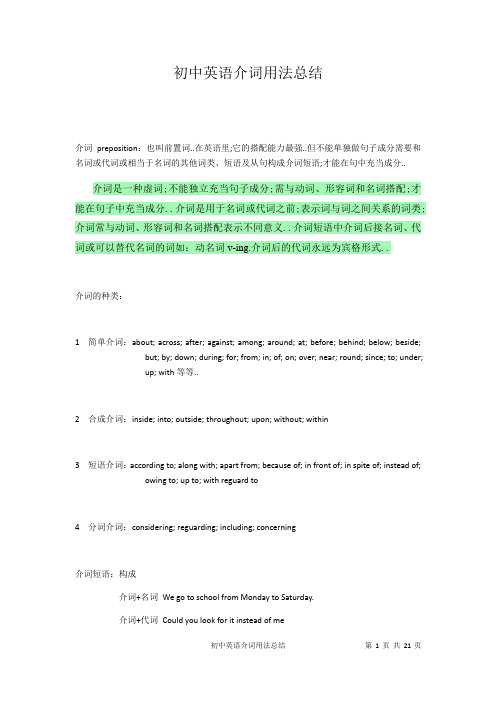
初中英语介词用法总结介词preposition:也叫前置词..在英语里;它的搭配能力最强..但不能单独做句子成分需要和名词或代词或相当于名词的其他词类、短语及从句构成介词短语;才能在句中充当成分..介词是一种虚词;不能独立充当句子成分;需与动词、形容词和名词搭配;才能在句子中充当成分..介词是用于名词或代词之前;表示词与词之间关系的词类;介词常与动词、形容词和名词搭配表示不同意义..介词短语中介词后接名词、代词或可以替代名词的词如:动名词v-ing.介词后的代词永远为宾格形式..介词的种类:1 简单介词:about; across; after; against; among; around; at; before; behind; below; beside;but; by; down; during; for; from; in; of; on; over; near; round; since; to; under;up; with等等..2 合成介词:inside; into; outside; throughout; upon; without; within3 短语介词:according to; along with; apart from; because of; in front of; in spite of; instead of;owing to; up to; with reguard to4 分词介词:considering; reguarding; including; concerning介词短语:构成介词+名词We go to school from Monday to Saturday.介词+代词Could you look for it instead of me介词+动名词He insisted on staying home.介词+连接代/副词I was thinking of how we could get there.介词+不定式/从句He gives us some advice on how to finish it.介词的用法:一、介词to的常见用法1.动词+toa动词+ toadjust to适应;attend to处理;照料;agree to赞同;amount to加起来达…;belong to属于;come to达到;drink to为…干杯;get to到达;happen to发生在某人身上;hold to紧握;lead to通向;listen to听;occur to想起;object to反对;point to指向;respond to回答;refer to参考;指的是…;涉及;reply to回答;see to负责;stick to坚持;turn to求助;write to给某人写信..b动词+sth.+to+sb.announce to通知某人; describe to向某人描述; explain to向某人解释; express to对某人表达; mention to提及; nod to向某人点头; report to报告; say to告知; shout to对某人大叫; suggest to对某人提建议;speak to与某人交谈; talk to跟某人谈话; whisper to和某人低声耳语..c动词+sth./sb.+ to +sth./sb.add to增加; compare to比作; carry to运送至; devote to致力于;introduce to介绍给; invite to邀请参加; join to连接到; leave to委托给;reduce to下降至; sentence to判处; take to带到..2. be +形容词/过去分词+ tobe alive to觉察;晓得;be attentive to注意;留心;be awake to知晓;be blind to缺乏眼光;be close to紧挨着;be common to对某人来说很普通;be contrary to违反;反对;be devoted to致力;be deaf to不愿意听;be equal to有…的力量;be exposed to暴露;遭受;be fair to对…公平;be familiar to对某人来说熟悉; be grateful to对某人心存感激; be good to对…有好处;be harmful to对…有危害;be important to对…重要;be kind to友好对待;be known to周知于;be married to嫁给;be moved to转移到;be near to靠近;be necessary to对…有必要; be opposite to在对面;be opposed to反对;be pleasant to合某人之意;be proper to专属;be polite to礼貌待人;be rude to粗暴对待;be relative to与…有关;be strange to不习惯;be similar to类似;be suitable to适合;be true to忠实;be thankful to感激;be useful to对…有用;be used to习惯..3.to+名词构成的词组to a degree在某种程度上; to date到现在为止;to one’s feet跳起来;to one’s mind照…看来; to one’s surprise使…吃惊;to one’s taste符合胃口; to oneself独自享用; to order定做;to the letter不折不扣地; to the point中肯地二、at的常见用法at构成的词组比较多;要细心区分..1.动词+ atarrive at抵达;call at访问某地; catch atit当场抓住; come at攻击; fire at向…开火;glance at瞟一眼; glare at怒目而视; grieve at忧伤;knock at敲;laugh at嘲笑; look at看一眼; pull at拉扯; rejoice at对…高兴;smile at向某人微笑; shoot at朝…射击; stare at怒目而视;thrust at刺向; tear at撕; tremble at颤抖;wonder at吃惊;work at工作..2. be +形容词/过去分词+ atbe angry at恼怒于; be alarmed at对…保持警觉;be astonished at对…吃惊; be bad at不擅长; be clever at对某事很灵巧;be delighted at高兴;be disgusted at厌恶; be disappointed at对…失望;be good at擅长; be impatient at对…不够耐心; be mad at狂热于;be pleased at对…感到高兴; be present at出席; be satisfied at满意;be surprised at吃惊; be shocked at对…非常震惊;be terrified at受到…的恐吓;be quick at对…很机敏..3.at+名词构成的词组at a distance在一定距离;at a loss不知所措; at a time一次;at all一点也不;at any cost不惜一切代价;at best最好也只是;at first起初;at hand手头;at heart在内心里;at home在家;无拘束;at last最后;at least至少;at most最多;at once马上;at present目前..三、介词on的常见用法on的用法比较重要;本文介绍它的一些常见用法:1.动词+ona动词+ on要认真区分下面一些词组act on对…有作用; bring on促使;导致; call on拜访某人;count on依赖; carry on执行;depend on取决; feed on以…为生;figure on料想;推断; go on继续;have on穿着; insist on坚持;keep on 继续; lean on依赖; live on以…为生; pull on迅速穿上;put on穿上; switch on接通电源; take to 喜欢;养成;轻易学会;turn on接通电源; work on操作; wait on侍候..b动词+sb.sth.+ on +sb.sth.base on以…为基础; congratulate on恭贺; fix on固定; have mercy on怜悯;have pity on怜惜; keep watch on监视; spend on把时间、精力花在某方面..2.be+形容词+on的词组be dependent on依赖; be hard on对某人苛刻;be impressed on对…印象深刻; be keen on渴望; be strict on对…严格..3.on+名词构成的词组on board乘车;飞机;on call听候召唤; on duty值班; on earth到底; on fire着火; on foot步行;on guard在岗;on hire雇用;on holiday度假四、介词in的常见用法1.动词+ina动词+ inbelieve in信任; break in碎成;bring in引起;产生;带来; call in下令收回; fill in填充;get in 收获; hand in上缴; involve in涉及; lie in在于; result in导致; share in共享;succeed in成功; take in卷起;订阅; turn in归还当局..b动词+sb./time/money+ inhelp sb. in帮助某人做某事; spare time/money in匀出时间或钱做某事;spend time/money in 花时间或钱做某事;waste time/money in浪费时间或钱做某事..2. be +形容词+ inbe active in活跃于;be absorbed in专心致志; be busy in忙碌; be born in出生于;be concerned in牵涉; be clothed in穿着; be disappointed in对…失望;be diligent in勤于; be experienced in在…有经验; be employed in任职于;be engaged in忙碌; be expert in某方面的专家; be excellent in在…优秀;be interested in对…有兴趣; be lacking in缺乏; be rich in富有;be slow in迟缓; be successful in在某方面成功; be skilled in精于;be strict in严于; be weak in弱于..3. in +名词in advance提前;in all总共;in balance总而言之;in bed卧床;in body亲自;in brief简明扼要;in case万一; in charge主管;in danger有危险; in debt负债; in despair失望;in force大量地;有效;in full全部地; in flower开花;in general一般说来;in itself本身; in love恋爱; in order井然有序; in person亲自;in public公开地; in progress有进展; in practice从实践上看; in rags穿着破衣;in research探索; in return作为报答;in ruins一片废墟;in short总之;in theory从理论上看; in trouble有麻烦; in tears眼泪汪汪;in time及时; in turn按顺序; in vain白白地;in view看得见..五、介词from的常见用法from的用法可不能小瞧;你不一定知道下面这些词组意义..1.动词+froma动词+ fromcome from来自;date from追溯; depart from违背; die from死于; escape from逃出;fall from自…跌落; hang from垂挂; hear from收到来信;learn from向某人学习; return from自某地返回;rise from自…冒出; result from起因于; suffer from忍受..b动词+ sth./sb. +from + sth./ sb. /a placeborrow from向…借; choose from选自; excuse from免除; keep from阻止做;prevent from 不准做; protect from不受…之害; receive from收到;remove from移动;除去; save from保全;拯救; separate from分离开来;stop from阻止..2. be +形容词+ frombe absent from缺席;be different from与众不同; be far from更不用说; be hidden from躲避;be made from用…制成; be tired from因…而疲倦..3.from…to…from bad to worse每况愈下;from beginning to end自始至终;from cover to cover从头到尾;from China to Peru到处;from day to day一天一天地;from door to door挨家挨户;from end to end从头至尾;from first to last自始至终;from hand to mouth勉强糊家;from head to foot从头到脚;from mouth to mouth广泛流传;from sun to sun从日出到日落;from start to finish从头开始;from top to toe从头到脚;from time to time不时地;from top to bottom彻底地..六、介词for的常见用法1.动词+fora动词+foraccount for解释;说明; answer for对…负责;apply for申请;请求;apologize for为…而道歉; beg for请求; call for要求;care for在意; enter for报名参加; fight for为…而战; hope for希望;inquire for查询;求见; leave for离开某地到另一地; look for寻找; long for盼望;mistake for 误认为; plan for计划做某事; prepare for为…作准备;provide for为…提供; reach for伸手去拿; run for竞选; stand for象征;search for搜寻; send for派人去请; speak for陈述意见、愿望; take for当作; wish for希望; wait for等待..b动词+sb.+ for +sth.ask for要求得到;blame for因…责备; excuse for宽恕; forgive for谅解; pardon for原谅;pay for花钱买; praise for称赞; punish for对…进行惩罚;push for催逼;reward for酬谢; thank for 对…表示谢意..2. be +形容词+forbe anxious for急于做; be eager for渴望; be bad for有害于;be convenient for便于; be good for利于; be famous for以…出名;be fit for适合于; be grateful for对…心存感激; be impatient for对…不耐烦;be late for迟到; be necessary for有必要; be ready for作好准备;be sorry for 为…而后悔; be responsible for对…负责;be suitable for适合于; be unfit for不适合; be useful for对…有作用..3.for+名词构成的词组for all尽管;for a song非常便宜地;for certain确切地;for company陪着;for ever永远;for example例如;for fear以免;for fair肯定地;for free免费;for fun为了好玩;for good永远;for instance比方;for luck祝福;for life终身;for long长久;for nothing白白地;for once有生第一次;for oneself替自己;for pleasure为了消遣;for reason因为…理由;for sale供出售;for shame 真不害臊;for short简称;for sport好玩;for sure确切地..4.动词+副词/名词+for构成的短语be in for将遇到;make up for弥补;go in for从事;look out for提防;take sth. for granted把…当作理所当然;have an ear for音感好;have a gift for有某方面的天赋..一、表示时间的介词一表示时间段的介词1in ; afterin +时间段;表示从现在起往后推算一段时间after +时间段;表示过去某时间往后推算一段时间;如:He’ll come back in two days. 但点钟用after after three o’clock He left on July 2 and returned after three days.2in ; during表示在一段特指的时间内;可用in 或duringThe work was done in / during the holidays.表示年份、月份、季节用in ; 如:in 1999 ;in June ; in winter3in last; for the past + 时间段; during表示在最近一段时间内;句中谓语动词常用现在完成时I have been in Shanghai in the last few years.4for 表示延续一段时间..I’ll study in the U.S for two yearsI’ve waited for Bingo for half an hour.二表示某一时间的介词1at; onat 表示某一时刻;on 表示某一天或日期; 如:at 7:14; on Saturday morning on the night of May2一天内各段时间表达; 选用正确的介词;请比较:in the morningon a winter / snow / cold / morningat nighton the night of March 7thin the eveningon Friday evening2before; bybefore 表示某一时间之前;而by 表示到某一时间止;句中谓语动词多用完成时态..如::You must get up before six. 你必须六点之前起床..By the end of last month the boy had got 4 “As”.到上月底这个男孩已得了4个A.3after ; sinceafter 可以表示过去某一点时间之后;并不延续说话时间;和一般过去连用;而since表示从过去某时间开始的一段时间延续到说话时间; 与现在完时连用如;My father lived in Shanghai after liberation .解放后我父亲住在上海.Since the end of last year the lady has given five concerts.自去年年底以来;这位女士开了五十场音乐会4from…to; until / tillfrom----to表示从某一点时间到另一点时间的一段时间;而until till 表示某动作或状态延续到某点时间如:My mother studied in Beijing University from 1960 to 1964.从1960年到1964年我妈妈在北京大学学习..My mother entered Beijing University in 1960; and studied there until 1964.我妈妈1960年进入北京大学;一直学习到1964年..但“从早到晚”常表达为from morning till night三不用介词表示时间的词或词组含this; that; last; next 的表示时间的名词词组;以及某些时间的副词或名词词组前不用介词;如:this year last summer; yesterday ; the day after tomorrow 等..二、表示事物之间位置的介词1at; in当事物被视作一点;不强调其空间常用介词at; 而表示空间内部用介词in; 如:We’ll meet at the supermarket 我们在超市见面I had to stay in the supermarket as it was raining hard因为下大雨;我只好呆在超市里*动词arrive 后接at ;表示较小的地方; 如: 车站、村庄等.后接in 表示较大地方;如: 城市;地区等2in; toin 表示事物在区域范围内的位置;to 表示事物对区域范围之外另一事物的位置;如:Shanghai is in the east of China. 上海在中国东部Japan lies to the east of China. 日本位于中国东面..in front of 表示在前面;一般不在范围内;in the front of 表示在前面.在同一范围内..3after; behind;On;Over;Under;Above;Belowafter 指顺序先后;behind 指位置在某事物之后;相对于in front of 而言; 如:He entered the classroom after the teacherHe hid himself behind the door 他在门后..4on ; inon 表示“在某事物表面上”..如将事物看作空间;表示在其内部;用介词in..There is a modern painting on the wall .There is a modern painting on the wall .5from ; off 都表示“离开”6above ; over; below ; underover ; under 表示垂直的上下关系;而above; below 仅表示位置上“高于”或“低于”; 不表示垂直关系..7between; amongbetween 表示“两个事物之间”; among 表示“三者以上的事物之间”..三、表示运动方向的介词1into; inside ; in 从外到内如:He went quickly into / inside the room.He went quickly into / inside the room.2out of 从里到外;相当于outside; 或从里向外;相当于fromShe went out of from the office in a hurry 她匆匆走出办公室.The boy watched the buses; cars and bikes out from the window .这男孩透过窗观看外面的公交车、小汽车和自行车..3on 在……表面;onto 到……上A boat is on the river. 一条小船在河上..He jumped onto a tree. 他跳上一棵树4across 穿过一平面、through 穿过一空间The boy kicked the ball hard and it moved across the grass.这男孩用力踢球;球飞过草地..The train moved fast through the tunnel. 火车飞驶隧道..5The train moved fast through the tunnel. 火车飞驶隧道..She walked to the bank 她步行到银行去She swam towards the shore 她朝岸边游去..四、常用介词用法比较1as ; likeas 表示“作为”强调身份;like 介词表示“像”As a teacher; he cares for these children.Like a teacher; he cares for these children.2with ; inwith 表示“外貌特征或附带的东西”;“用……作工具”in 表示”衣着””用某语言”; 在固定搭配中也可用inA man with dark glasses wanted to buy drinks.A man in black wanted to buy drinks.The boy is learning to write in pencil / with a pencil.He retold the text in English.3for ; tofor表示“为了.”To 表示动作对象; “对; 向.”如:He would do anything for his motherland.Did you mention this to my father 你对我父亲提起过这件事吗for 表示“就某情况而说”; to 表示一“对某对象而言”如:It’s quite warm today for February.就二月的天气;今天够暖和的..What he told you just now was not new to me他刚才对你所说的话对我并不新鲜for 表示“目的;用途”..与go; come 动词连用;4except ; besidesexcept 表示“从总体中排除一部分”; 与bat 同义; besides 表示“除了一部分还有另一部分”We all failed except him. 我们都失败了;但他没有..He speaks German besides French.他懂法外还会讲英语..5注意成对介词的用法:get into out of the car; get on off the bus; jump onto off the platform; out of6介词和名词动词等有不少固定搭配和习惯用法:to one’s surprise / joy; in charge of ; instead of; in bed hospital; in trouble; in a hurry; in surprise; with a smile; with one voice; according to; at once; on time; in time; in all; at home; school; work; at last; at least; in the end; by the way; for example; at the same time; at the same speed; on one’s way to; in the sun; on the football team; in line; with the help of; in red / green …put on; look for; look after; run after; send for; enter for; pay for; show…around; listen to; arrive in / at; get to; agree with; succeed in; think of about; wait for;….7表示加减乘除;分别用介词plus; minus; times 和动词过去分词divided + by二、复习时需要注意的要点1 介词一般放在名词之前;但它后面的介词宾语是疑问代词、疑问副词或者关系代词时;这些词提到了前面而只剩下介词在后了..2 介词和动词、形容词、名词等常常构成固定搭配;也就是说;在这些词的后面常常要求用一定的介词..这一点在学习时要特别注意..如:a.动词+介词:laugh at; wait forb.形容词、过去分词+介词:be good at; be prond ofc.名词+介词:pay a visit to ; the key to实战演练一、例题选讲例1We will play football three o’clock.A.In B.After C.To D.Since 答案:B提示:这四个选项的介词都可以表示时间;但含义和用法不同..in常用来表示以现在为起点的将来一段时间之后;after·可表示从过去为起点的一段时间之后;通常与过去时连用..但要注意after·也可以表示将来某一特定时刻之后..本题里after表示将来某一特定时刻..例2The story took place a cold night.A.In B.After C.To D.Since 答案:B提示:on通常指特定时期:或表示某一天的上午;下午;晚上等..句中的时间状语a cold night已表明在某个寒冷的夜晚;其前面应使用介词on..例3We will play football three o’clock.A.In B.After C.To D.Since 答案:B提示:这四个选项的介词都可以表示时间;但含义和用法不同..in常用来表示以现在为起点的将来一段时间之后;after·可表示从过去为起点的一段时间之后;通常与过去时连用..但要注意after·也可以表示将来某一特定时刻之后..本题里after表示将来某一特定时刻..例4The story took place a cold night.A.In B.After C.To D.Since 答案:B提示:on通常指特定时期:或表示某一天的上午;下午;晚上等..句中的时间状语a cold night已表明在某个寒冷的夜晚;其前面应使用介词on..例5This is the bus the People’s Park.A.At B.For C.To D.Towards 答案:B提示:四个选项的介词表达的意义不同..at表示“在某处;在……旁边”;for表示“动身去……处”;to 表示“到……某处”;towards表示“向……某处”..—Are your parents workers—No; is a worker.A.Neither B.none C.Either D.Both 答案:A提示:neither是对两个人或事物的否定;谓语用单数形式;而both则是对两个人或事物的肯定;谓语用复数形式..例7The work cost us more than five weeks.保持原意more than five weeks the work. 答案:We spent; on提示:cost表示花费时间;只能用表示事物的词作主语;而spend也表示花费时句子主语必须是人..注意spend…on;表示在某事上花费..例8Beijing has a lot of old buildings. It also has a lot of new ones.合并一句答案:Beijing has not only a lot of old buildings but also a lot of new ones提示:这道题主要掌握表示递进关系的连词词组..例9My brother likes skating.I like swimming.合并一句答案:My brother likes skating but I like swimming.这道题的两个句子主语不是同一个人;谓语动词之后的部分也不同;实际上是把喜欢的内容由一个方面转到另一个方面;所以用but把两个句子连接起来..例10He is too young to join the army.改复合句答案:He is so young that he can’t join the army.提示:so...that表示否定时可与too…to转换..例11There is a hole the wall.A.In B.On C.Of D.With 答案:A提示:在墙的里面;用in the wall;而on the wall指在墙的表面上..例12English names are different Chinese names.A.Between B.Of C.From D.about 答案:C提示:be different from表示“与……不同”;是一个固定词组..例13We always have a class meeting Monday afternoon.A.At B.On C.In D.Of 答案:B提示:在某天的上午下午或晚上;介词应使用0n..例14Please write it inkA.With B.In C.By D.Of 答案:B提示:如果表示用墨水写该用in;不能用with..例15I’ll return the book to the library I finish reading itA.When B.If C.as soon as D.As 答案:C提示:此句意思为我一看完这本书就还给图书馆;as soon as是“一……就……”的意思..初中英语介词用法总结第21 页共21 页。
初中介词用法归类.docx
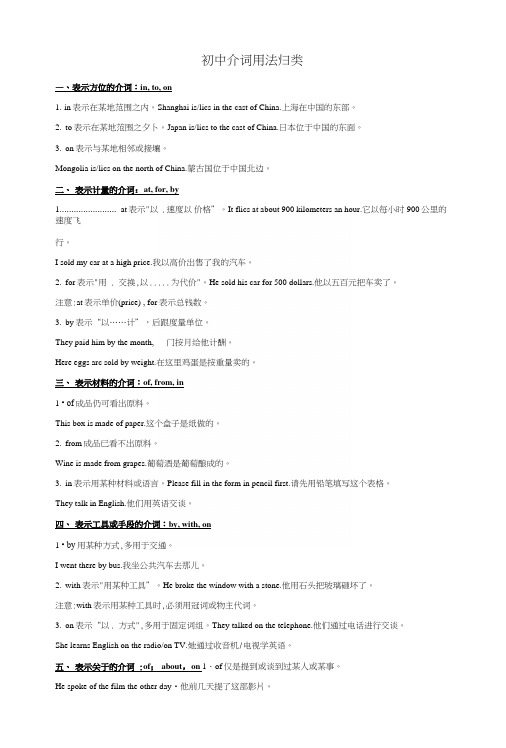
初中介词用法归类—、表示方位的介词:in, to, on1.in表示在某地范围之内。
Shanghai is/lics in the cast of China.上海在中国的东部。
2.to表示在某地范围之夕卜。
Japan is/lics to the cast of China.日本位于中国的东面。
3.on表示与某地相邻或接壤。
Mongolia is/lics on the north of China.蒙古国位于中国北边。
二、表示计量的介词:at, for, by1........................ at表示"以. 速度以价格”。
It flics at about 900 kilometers an hour.它以每小时900公里的速度飞行。
I sold my car at a high price.我以高价岀售了我的汽车。
2.for表示"用 . 交换,以..... 为代价"。
He sold his car for 500 dollars.他以五百元把车卖了。
注意:at表示单价(price) , for表示总钱数。
3.by表示“以……计”,后跟度量单位。
They paid him by the month, 门按月给他计酬。
Here eggs arc sold by weight.在这里鸡蛋是按重量卖的。
三、表示材料的介词:of, from, in1 • of成品仍可看出原料。
This box is made of paper.这个盒子是纸做的。
2.from成品已看不岀原料。
Wine is made from grapes.葡萄酒是葡萄酿成的。
3.in表示用某种材料或语言。
Please fill in the form in pencil first.请先用铅笔填写这个表格。
They talk in English.他们用英语交谈。
四、表示工具或手段的介词:by, with, on1 • by用某种方式,多用于交通。
介词用法分类.docx
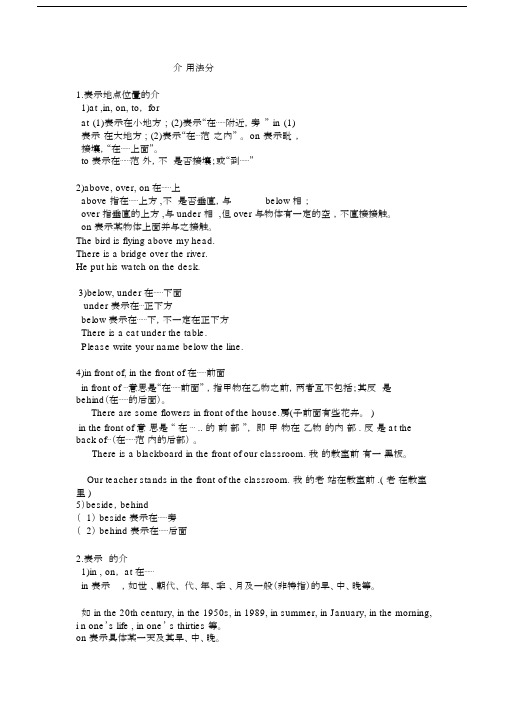
介用法分1.表示地点位置的介1)at ,in, on, to, forat (1)表示在小地方 ; (2)表示“在⋯⋯附近,旁” in (1)表示在大地方 ; (2)表示“在⋯范之内”。
on 表示毗,接壤,“在⋯⋯上面”。
to 表示在⋯⋯范外,不是否接壤;或“到⋯⋯”2)above, over, on在⋯⋯上above 指在⋯⋯上方 ,不是否垂直,与below 相;over 指垂直的上方 ,与 under 相 ,但 over 与物体有一定的空,不直接接触。
on 表示某物体上面并与之接触。
The bird is flying above my head.There is a bridge over the river.He put his watch on the desk.3)below, under 在⋯⋯下面under 表示在⋯正下方below 表示在⋯⋯下,不一定在正下方There is a cat under the table.Please write your name below the line.4)in front of, in the front of 在⋯⋯前面in front of ⋯意思是“在⋯⋯前面”,指甲物在乙物之前,两者互不包括;其反是behind(在⋯⋯的后面)。
There are some flowers in front of the house.房(子前面有些花卉。
)in the front of 意思是“在⋯ .. 的前部”,即甲物在乙物的内部 . 反是 at the back of⋯(在⋯⋯范内的后部)。
There is a blackboard in the front of our classroom. 我的教室前有一黑板。
Our teacher stands in the front of the classroom. 我的老站在教室前 .( 老在教室里 )5)beside,behind(1) beside表示在⋯⋯旁(2) behind 表示在⋯⋯后面2.表示的介1)in , on, at 在⋯⋯in 表示,如世、朝代、代、年、季、月及一般(非特指)的早、中、晚等。
- 1、下载文档前请自行甄别文档内容的完整性,平台不提供额外的编辑、内容补充、找答案等附加服务。
- 2、"仅部分预览"的文档,不可在线预览部分如存在完整性等问题,可反馈申请退款(可完整预览的文档不适用该条件!)。
- 3、如文档侵犯您的权益,请联系客服反馈,我们会尽快为您处理(人工客服工作时间:9:00-18:30)。
量子场女生英语承诺中考115 分、高考 120 分初中英语介词的用法一、介词按其构成可分为:1.简单介词 at, in, on, to, since, until等。
如:He's worked there since 1998.2.复合介词 into, onto, out of等。
如:She is out of school.她毕业了。
3.二重介词 from under, from behind, from out of, until after, except in等。
如:I'm from out of town.我是从城外来的。
4.短语介词 because of, instead of, in spite of等。
如:I went back not because of the rain, but because I was tired.我回去不是因为下雨,而是因为我累了。
二、介词的作用:1.表示地点:after, along, at, below, by, of, near, over, through, under等。
如:Near the village the boys are skating on the ice.男孩子们正在村子附近的冰上滑冰。
They lay down under the shade of a tree.他们躺在一棵树的树阴下。
2.表示时间:about, after, across, at, during, for, in, of, till, until等。
如:After class he will tell us about the accident.课后他将告诉我们有关事故的情况。
A heavy rain has been falling across three days.一场大雨下了整整三天。
The accident happened during the night.事故发生在夜间。
3.表示动作:at, across, around, on, over, under等。
如:The earth goes around the sun.地球绕太阳运行。
The car is under repair.汽车在修理中。
4.表示比较: as, like, above, over, with等。
如:She was something like her sister.她有几份像她的妹妹。
Chinese is much more difficult in contrast with English.和英语相比,汉语难得多。
5.表示原因: about, for, from, with等。
如:Don't worry about my lessons.不要担心我的功课。
Business kept me from coming.我因事不能来。
He was angry with what I did.他对我所做的很气愤。
6.表示条件: to, with, without等。
如:Without your advice, he would have failed.没有你的忠告他可能已经失败了。
7.表示手段、方式: as, by, in, with等。
如:He behaved as a drunkard.他的举止如同醉汉一样。
Learn the new words by heart.记住这些生词。
We see with our eyes.我们用眼睛看。
8.表示距离、数量: from, in, within等。
如:My house is ten miles from the school.我家离学校十英里。
They were thirty in all.他们总共有三十人。
9.表示目的: as, for等。
如:I only said it as a joke.我只是把它当作笑的。
It's time for class.到上的了。
10.表示步:for, with等。
如:For all his effort, he didn't succeed.然他做了一番努力,仍不能成功。
With all his money, he is unhappy.尽管他有,但他并不快。
for可以引插入,例如:I, for one, shall vote against the proposal.我也投票反个提。
介的用法一1.与形容搭配的有:be afraid of(怕 )be angry with(生某人的气 )be away from(不在某地 )be different from(与⋯⋯不同 )be good at( 善于 )be good/ bad for (⋯⋯有益 / 有害 )be interested in(⋯⋯感趣 )be late for(到 )be/get ready for(作好准 )be sure of (⋯⋯有把握 )be worried about(⋯⋯感到担 )2.介后常用人称代格和-ing形式1)You must take good care of her.2)Thank you for teaching us so well.3.几易混淆的介A.“在⋯⋯之后”in +一段(用于一般将来)after +一段(用于一般去)after +一点(常用于一般将来)如:The baby stopped crying after half an hour.The baby will stop crying in half an hour.They will visit their teacher after Friday.B. for +一段since +去的一点两者均用于在完成,具体在部分,我会向同学解。
C. be made of“用⋯⋯制成”be made in“由某地制造”be made by somebody “由某人制成”D. in , on, at表in表示“在某月(季、年等)”如: in 1996, in January, in summer固定: in the morning, in a week, in a minute, in time, in the end on用于指具体的某一天或指某一天上午、下午或晚上等。
如: on Christmas Day, on the night of February 16at用于具体刻前和某些固定中。
固定: at seven, at the moment, at night, at last, at first,at noon, at times, at once, at this time of the year, at the beginning of, at the end of this month,at the same time。
注意:在表里,下列情况下一般不用介。
里有:next, last, this, that, tomorrow, yesterday, one, every, all以及the day before yesterday和the day after tomorrow前不用介。
如:不能in tomorrow ,只能tomorrow(在明天)E. except +格/doing something“除⋯⋯之外” (不包括本身)Everyone is at school today except Lin Tao. (同句)= Only Lin Tao isn't at school today.F. “用”交通工具by plane用言 in English通媒介on/ over the telephone, on/ over the radio, on TV用工具手段with a pen, with one's handsG. between “在⋯⋯和⋯⋯ ( 两者) 之”between ⋯ and ⋯,between the two⋯among 在⋯⋯之 ( 三者或三者以上)英常用介的用法1) at, in ,on, over, under(a) at 在⋯⋯“at +N / ( place )” 的基本意在于表达空或位置的点的概念。
例: Thereis a ball at the foot of the desk.(在桌的桌腿那里有一个球。
)就我日常生活的活来看,如下面各短所指的所都属于点的概念。
at home在家at work在工作所,(外出工作)不在家at the door/ window在/窗口at the office在公室at school在学校at ( the ) university在大学at the bus stop在公共汽站at the station在站at the crossroads在十字路口at the bridge在at the next corner在下一个街角at the baker's在面包店at No . 36, Park Street公园街36 号at the party在宴会中at a meeting在会at the club在会at one's desk在自己的桌at ( [ 美 ]the )table在餐桌;在吃at the bottom of⋯在⋯⋯的底部at the foot of⋯在⋯⋯的脚at the end of⋯在⋯⋯的末端 / 尽at the center of⋯在⋯⋯的中央注:注意下面两句的区:I met her in the station.(我在站里遇她。
—station指建筑物)I met her at the station.(我在站遇她。
— station 指交通上的点,遇她的地方有可能在站里面,也可能在站外面。
)(b) in 在⋯⋯里面 / 之中“in + N / ( place )”的基本意是表示在面或空的范里面。
例: Mywatch is in the drawer of my desk.(我的手表在我的桌抽里面。
)可用“ in⋯”来表达的所、地点、位置、空等可以如下:in +洲名、国名、地区名、州/ 省⋯⋯区域名、城市、村名等。
in Asia在洲in China/ the United States在中国 / 美国in Siberia / the West在西伯利 / 西部in California/ Fu Jian在加州 / 福建省in the southern part of Taiwan在台湾南部in London/ Beijing在敦 / 北京in town/ the country在上 / 下in +日常生活所in the street在街道中in the park在公园里in the woods/ trees在林里in the field在田野里in the garden在花园里in the campus在校园里in the library在里in the office在公室里in the gym在体育里in +三空in the sky在天空in the sun在太阳光下in the rain/ snow在雨/雪中in the dark在黑暗中in the ocean/ sea在海洋中in the river/ pool在河 / 游泳池里in the building/ house在建筑物 / 屋里in +容器in the / a box / bag在盒/袋里in the bottle在瓶子里in the drawer在抽里in the basket在子里in the pocket在衣袋里其他in his book在他的中in the newspaper在上her poems在她的中in that story在那故事中in your report在你的告中in the middle of在⋯⋯的中央;在⋯⋯当中in the center of在⋯⋯的中央in the corner of在⋯⋯的角落里注: in the corner of(内角)on the corner of(外角)at the corner of(交叉角)例: There is a wastebasket in the left back corner of the classroom.(教室后面的左角有。
